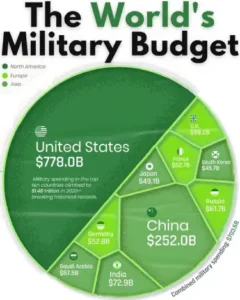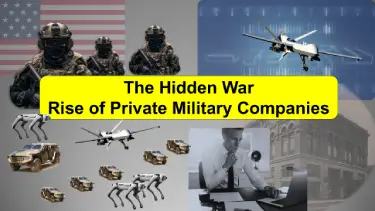Description
Discover how private military companies like Blackwater impact global conflicts, pushing war into the shadows. Explore solutions for ethical oversight.
Modern warfare is evolving rapidly, influenced by advanced technologies like artificial intelligence, drones, and robotics. However, the most notable change, often overlooked, is the privatization of military forces. Companies like Blackwater have redefined how wars are fought, bringing both innovation and controversy.
This article delves into the history, rise, and implications of private military companies, offering insights into their profound impact on global conflicts and the urgent need for ethical oversight.
The Changing Face of War
Modern Warfare Technology

AI-guided drones, robot dogs, and advanced surveillance technologies are transforming battlefields. In Gaza, Israeli warplanes use artificial intelligence to select targets. In the US, drones, and robotic dogs patrol borders, highlighting the increasing reliance on technology in military operations.
Privatization Overview
The privatization of military forces marks a shift in how wars are conducted. Private military companies (PMCs) like Blackwater provide security, training, and combat services, working alongside national armies but often with less oversight.
Global Impact
Mercenaries from PMCs are now involved in conflicts worldwide, from Ukraine to Yemen. These privately hired soldiers fight on behalf of various governments and organizations, often operating in the shadows, away from public scrutiny.
The Birth of Blackwater
Eric Prince and Blackwater
In 1997, Eric Prince, a former US Navy SEAL, founded Blackwater. Backed by his family’s wealth, Prince set up an ultramodern training facility in North Carolina, positioning Blackwater as a premier provider of military services.
Early Operations
Blackwater’s timing was impeccable. The company began operations as the US government, under President George W. Bush, embraced military privatization. Blackwater quickly secured lucrative contracts, providing security and training services.
Political Climate
The early 2000s saw a surge in military privatization, driven by neoconservative policies. Key figures like Defence Secretary Donald Rumsfeld and Vice President Dick Cheney advocated for a leaner, more efficient military, heavily relying on private contractors.
Blackwater’s Rise to Power
9/11 and Aftermath
The 9/11 attacks and later War on Terror created unprecedented demand for private military services. Blackwater capitalized on this demand, securing a $27 million contract to provide security for US officials in Iraq.
Iraq War Contracts
As the Iraq War escalated, Blackwater’s role expanded. By 2007, the company had received over $1 billion in contracts from the State Department, many of which were awarded without competitive bidding.
Controversial Incidents
Blackwater’s operations were marred by controversy. The Nisour Square massacre in 2007, where Blackwater guards killed 17 Iraqi civilians, highlighted the lack of accountability and oversight for PMCs. Despite widespread condemnation, Blackwater continued to receive government contracts.
Expansion and Evolution
Diversification
Blackwater diversified its services, setting up divisions for intelligence, aviation, and armoured vehicles. The company offered a wide range of services, from security to logistics, cementing its role in the military-industrial complex.
Global Recruitment
To meet growing demand, Blackwater recruited mercenaries globally, often hiring former soldiers from Latin America, Africa, and Eastern Europe. This international workforce operated in various conflict zones, often with little transparency.
Involvement in Torture Programs
Allegations surfaced that Blackwater took part in CIA rendition and torture programs, transporting detainees to secret locations worldwide. These activities further blurred the lines between public and private military operations.
Financial and Political Entanglements
Private Equity Involvement
Private equity firms saw the profitability of war, investing heavily in PMCs. Companies like Apollo Global Management bought Blackwater (rebranded as Constellis), combining various military services under one umbrella.
Secrecy and Lack of Accountability

The private nature of PMCs allows them to operate with minimal oversight. Unlike national armies, PMCs do not have to show casualties or operational details, creating a black hole of accountability.
Biden’s Military Budget

In 2023, President Joe Biden requested an $842 billion military budget, with significant portions given to private contractors. This trend highlights the entrenched role of PMCs in US military strategy.
The Current Landscape
Rebranding and Consolidation
Blackwater rebranded multiple times, eventually becoming Constellis Holdings. The new entity encompasses various PMCs, each with a specific focus but united under a single corporate structure.
Corporate Influence
Private equity ownership has expanded PMC operations. Constellis, owned by Apollo Global Management, operates globally, offering a range of services from security to logistics, further embedding PMCs in modern warfare.
Ongoing Conflicts
PMCs continue to play significant roles in conflicts worldwide. From Ukraine to the Middle East, these companies provide critical support, often working in high-risk areas where traditional military forces are limited.
Australia’s Involvement in Private Military Companies
Historical Context
Australia has a history of taking part in international conflicts, often as an ally to the United States and other Western nations. The rise of PMCs has seen Australian personnel increasingly involved in these operations, either directly or through subcontracting.
Australian Personnel in PMCs

Many former Australian Defence Force (ADF) members have joined PMCs, using their military expertise in various conflict zones. This involvement extends to security roles in Iraq, Afghanistan, and other hotspots.
Government Contracts and Partnerships
Australia’s government has engaged PMCs for specific roles, including training and advisory services. These contracts often support missions where Australian forces are present but work under the guise of private entities to minimize direct military engagement.
Ethical and Legal Concerns
The use of PMCs raises significant ethical and legal questions for Australia. The lack of transparency and accountability in PMC operations contrasts sharply with the standards expected of national military forces, leading to debates about oversight and regulation.
Calls for Greater Oversight
There is growing advocacy within Australia for increased oversight and regulation of PMC involvement. Experts argue that Australia should lead by example, ensuring that any participation in privatized military operations adheres to strict ethical guidelines and transparency standards.
Future Implications
Questions of Accountability
The rise of PMCs raises significant questions about accountability. Who oversees these companies? How are they regulated? The lack of transparency poses significant ethical and legal challenges.
Potential for Abuse
The privatization of war increases the potential for abuse. Without stringent oversight, PMCs can work with impunity, leading to human rights violations and unchecked power.
Eisenhower’s Warning
In his 1961 farewell address, President Dwight D. Eisenhower warned of the dangers of the military-industrial complex. Today, his words resonate as the influence of private military companies grows unchecked.
Conclusion
The rise of private military companies like Blackwater has transformed modern warfare, pushing it into the shadows. These companies operate with minimal oversight, raising critical questions about accountability and ethics. As PMCs continue to expand their influence, it is imperative to set up robust regulations and transparency to ensure ethical conduct and protect human rights.
Question for Readers
How can we ensure accountability and ethical conduct in the operations of private military companies?
Call to Action
Stay informed about the role of private military companies in global conflicts. Advocate for transparency and accountability in military operations to protect human rights and uphold ethical standards.
Social Sharing
If you found this article insightful, please share it with your network on social media.
References
Stockholm International Peace Research Institute : https://www.sipri.org
Center for Strategic and International Studies: https://www.csis.org
Human Rights Watch: https://www.hrw.org

